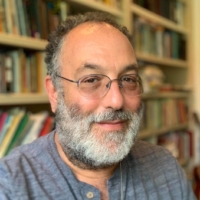By Stan Paul
Ron Avi Astor, an internationally recognized expert on school safety and violence, will join the UCLA Luskin School of Public Affairs faculty during the 2019-20 academic year.
Astor will hold the title of Marjorie Crump Endowed Professor of Social Welfare at UCLA Luskin, said Dean Gary Segura. The Southern California native comes to UCLA after a long research and teaching appointment at the University of Michigan and, more recently, at USC.
Astor’s work examines various aspects of the role of physical, social-organizational and cultural contexts related to violence in schools in California and the United States, as well as around the globe — including schools in Kosovo, Cameroon, Israel, Chile and Asia. His expertise includes school safety, sexual harassment, bullying and victimization, as well as fighting in school, emotional abuse, school social work and military social work. He also focuses on ways to create welcoming environments, using the voices of students, faculty, administrators and parents to improve school and district climates.
“Dr. Astor’s work has been recognized as outstanding by the leading research organizations in both social work, psychology and education,” said chair Laura Abrams, professor of Social Welfare. “He will bring with him an incredible research portfolio, along with excellence in teaching and mentoring, which will be of great benefit to our Social Welfare program, to Luskin, and to UCLA as a whole.”
Abrams continued, “Professor Astor is one of the foremost experts in the world on how to cultivate safe and nurturing schools for children around the globe,” adding that Astor’s work addresses major societal questions such as how to ensure that schools function as a positive mechanism for children even in the context of unsafe neighborhood violence. “This research is critical as schools play a major role in shaping key child outcomes.”
Astor, who grew up attended schools in the San Fernando Valley, earned his doctorate in human development/school psychology from UC Berkeley and holds master’s degrees in social welfare and community organization.
Astor sees connections between research and practice regarding bullying. “I don’t separate practice out from the research and policy I do,” said Astor of his unique combination of degrees, especially his MSW. “It’s actually kind of a core philosophical, spiritual and empirical center of everything I do.”
His studies in social work meld well with his graduate study in community organization, Astor said. “The idea is that you needed both — I knew that early on I had the sense you needed this larger ecological system, you couldn’t just be focusing on individuals. … You had to be looking at the multiple links of the social ecology and how they all interacted.
“I’m one of those hybrids almost wherever I go,” added Astor, who has published in a wide array of professional journals and is a fellow of the American Psychological Association, American Educational Research Association and Society for Social Work Research. He is also a member of the prestigious American Academy of Social Work and Social Welfare, and the National Academy of Education.
“I know the fields like to separate practice, research and theory, but to me they’re continuous. That’s another reason why I’m publishing in these various areas because there’s more fluidity,” Astor said. “So, the MSW is critical to my whole way of ecological thinking.”
His latest book, “Bullying, School Violence, and Climate in Evolving Contexts: Culture, Organization, and Time,” which he co-authored with Rami Benbenishty of the Hebrew University of Jerusalem, was published in January by Oxford University Press. Astor said that although this book is theoretical and empirical, “most of those ideas comes from being on the ground and having the MSW and having ecological theory and seeing how empowerment in communities that actually work form our interventions and theory.” Astor’s other recent books were based on best practices for school professionals that dovetail with the more scientific version published this year.
Astor has a state teaching credential and comes from a family of school educators. As a practitioner, he has spent time in schools and communities over a span of decades. He said that his experiences in schools and being “on the ground” has informed him about gaps in theory, policy and practice.
Astor said his approach does not just look at how to fix problems but focuses more broadly on how social work, education, public health, policy and psychology can come together to discover “what are the healthiest kinds of settings we could have our children grow up in, and what would be the most optimal, welcoming, caring places we would aspire to.”
Astor is also interested in learning more from schools that have had track records of outstanding work on how their positive practices can translate to other schools that seem to share similar risk factors.
“Those remarkable schools where the students, principals, teachers, parents and community are working in tandem are really fun to learn from because they change how we might provide supports or service to students. They also change our theory and our ways of thinking,” Astor said. Teachers, principals and parent/student groups may have better solutions than university professors and researchers — “often we find these stellar individuals and groups have generated creative approaches to solve problems in their communities, schools or school districts — and we can learn so much from them.”
Astor explained that he is not just looking to fix problems but looking to create communities and settings where these problems, if everything is set up right, don’t occur in the first place.
“It’s really only about prevention. It’s really more an image of what kind of society we want to live in, what kind of optimal democracy do we want to create,” he said. “It’s really about creating the kinds of environments that make human beings thrive.”

